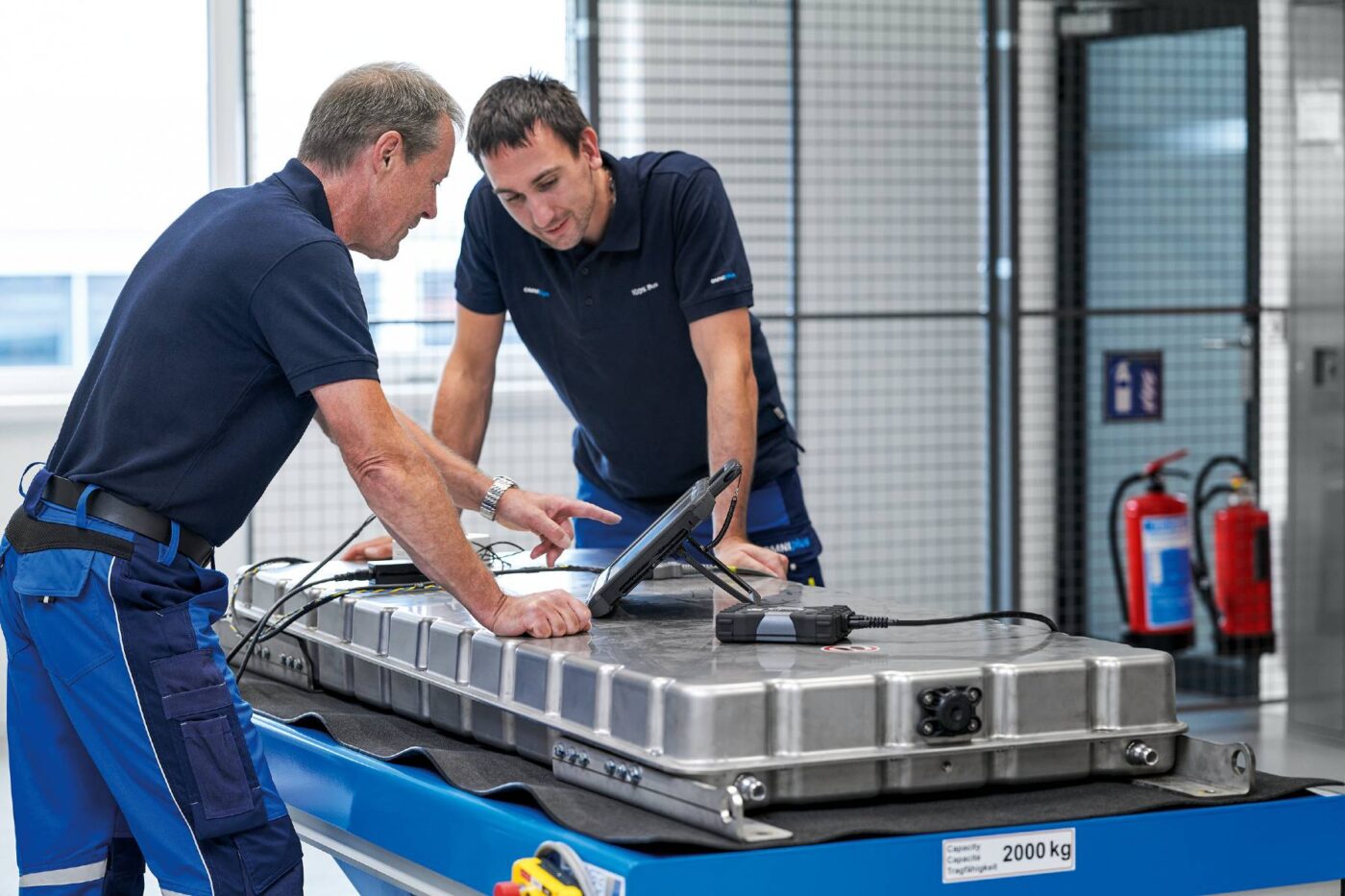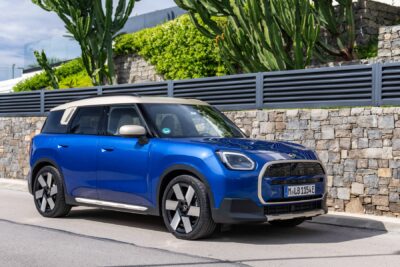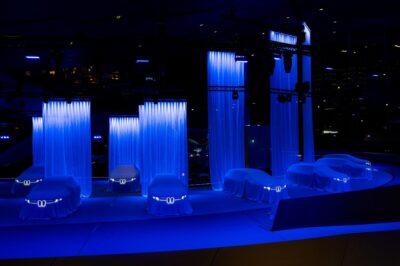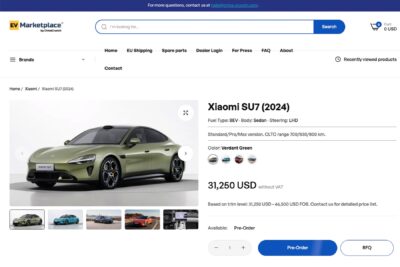Daimler Buses sets up comprehensive battery services for eCitaro
Till Oberwörder, CEO of Daimler Buses, speaks of a breathtaking pace of development in bus batteries: “We are learning very quickly: you can see this in our battery generation for the eCitaro, which will soon be the fourth. This is a speed that is also being transferred to all complementary business areas.” Daimler Buses therefore wants to ensure that customers with early batteries, which like all batteries have lost capacity over the years, can still operate their e-buses for a long time to come. In a business update to journalists, Oberwörder outlines how his company intends to tackle this task. The most important buzzword is ‘extended e-service network’, which essentially comprises the reconditioning and replacement of batteries from the eCitaro.
What does that mean in concrete terms? According to Daimler Buses, individual battery modules are checked during reconditioning and, if necessary, replaced. This step is carried out together with the battery manufacturer. Thanks to this reconditioning, “the state of health of the battery can be significantly increased again,” the manufacturer explains. When the battery is replaced, however, the previous complete battery pack (generation NMC1 to NMC3) is replaced with a fourth-generation battery (NMC4). This applies to all batteries installed in the bus (the eCitaro solo bus is known to have space for up to six battery packs). However, the replacement will not be possible until 2026, when the new NMC4 battery generation is also available. Daimler Buses, on the other hand, is now offering battery reconditioning – in cooperation with the previous manufacturer Akasol. The offer initially applies to buses with first-generation batteries. “In the future,” however, the so-called ‘rework’ service will also be extended to NMC2 and NMC3 batteries.
Target service life at diesel level
The declared aim of Till Oberwörder and his team with this business expansion is to harmonise the service life of electric buses with that of diesel buses. This will require the services described above, as the company CEO believes that the first-generation batteries installed in the early eCitaros will soon reach the end of their service life. Oberwörder gives them “7 to 8 years” before they fall below a capacity limit that makes them unusable for public transport applications. The vehicles themselves, on the other hand, last much longer. Thanks to reconditioning and replacement of the battery, the top manager, therefore, believes that a service life of up to 15 years is realistic for the eCitaro in future.
Daimler Buses sees the two services as part of a wider e-service offensive that focuses on the entire life cycle and cost-effectiveness of electric buses and batteries. The company is initially only offering the new services for the eCitaro city bus. However, they are also “a possible prospect in the future” for the future eIntouro intercity electric bus. Daimler Buses presented a near-series prototype of the eIntouro at the end of 2024, with the market launch planned for 2026. Unlike the eCitaro, however, the intercity bus will be fitted with LFP batteries from Chinese manufacturer CATL, which are also used in the eActros 600 electric truck.
Which battery chemistry for which bus?
A brief digression on the battery portfolio at Daimler Buses: when it is launched in 2026, the eIntouro will have up to two packs of 207 kWh each, i.e. a maximum capacity of 414 kWh for a range of up to 500 kilometres. The manufacturer has opted for LFP chemistry here, as the requirements in the intercity segment differ from those of classic, urban public transport. Although LFP batteries generally charge more slowly and have a lower energy density than NMC, Daimler Buses appreciates the fact that they age more slowly (service life of up to 15 years is possible for individual applications) and have a higher net capacity (‘over 95 per cent of the installed capacity’).
The eCitaro, on the other hand, will continue to use nickel-manganese-cobalt batteries. Daimler Buses already publicised a year ago that a fourth battery generation is in the works. The new NMC battery is expected to have 111 kWh, achieving a higher energy density with the same battery size. This also means a longer range. The new batteries will be assembled by BMZ Poland, the Gliwice-based subsidiary of BMZ Holding from Karlstein am Main. Daimler Buses is thus saying goodbye to Akasol. The bus manufacturer had previously entrusted battery assembly to the German battery system manufacturer, which was acquired by the US group BorgWarner in 2021. The NMC3 packs are currently rolling off the production line at Akasol in the German state of Hesse. From the beginning of 2026, however, the latest generation of batteries will come from Poland. The BMZ subsidiary there was founded in 2010 and is in the process of expanding its production at the Gliwice site as part of the new strategic collaboration with Daimler Buses.
Daimler Buses introduced the current NMC3 battery in September 2022. It is based on round cells of the 21700-format (21 mm diameter, 70 mm length), whereby 600 cells fit into one battery module and nine modules are assembled into a pack. The energy content at pack level is 98 kWh. Up to six packs (ergo: 588 kWh) can be installed in the twelve-metre-long eCitaro solo bus, and up to seven packs (686 kWh) in the 18-metre-long articulated bus version. According to Daimler Buses, this should currently enable ranges of 400 kilometres for the electric solo bus and 300 kilometres for the corresponding articulated bus. Akasol states that the battery has a service life of up to 4,000 charging cycles. Here is an overview of the new and old battery generation in comparison:
| NMC3 | NMC4 | |
|---|---|---|
| eCitaro* | 400 km | 500 km |
| eCitaro G* | 300 km | 400 km |
| eCitaro fuel cell** | up to 600 km | up to 700 km |
| eCitaro G fuel cell** | up to 500 km | up to 600 km |
* Equipped with maximum battery capacity.
**Equipped with maximum battery capacity- and H2-capacity.
NMC4 should also revitalise the used vehicle market
Oberwörder describes the advantage of the new collaboration with BMZ as the fact that the fourth-generation batteries have already been in mass production for other users in the bus industry since 2022. In this respect, no new development is required for use in the eCitaro, only “a further development.” At the same time, the new battery promises higher energy densities and a longer service life.
If these NMC4 batteries are used in future to replace second or third-generation batteries, it may be possible, according to the manufacturer, that “fewer batteries will be required to achieve the same or higher total capacity with the NMC4 batteries.” According to Oberwörder, this is also an important signal for the used vehicle market: “We are closing the loop here and including the used vehicle business,” he emphasised – by explicitly using the reconditioning and battery replacement for the new NMC4 generation by his company for the used vehicle range in the ‘BusStore.’
Up to 12-year warranty in future
As a further component, Daimler Buses is introducing guarantees of up to twelve years for new purchases of eCitaro buses with the NMC4 battery on board in 2026. Thanks to its modular design, the battery from Poland should be easy to maintain. Daimler Truck believes that its service network of currently 100 locations in Europe is well equipped to provide appropriate maintenance, repairs and the new ‘e-services’: The service employees are specially trained and the locations are equipped with special facilities such as high stands or battery cranes ‘to work directly on the high-voltage components or to repair or replace complete batteries’.
Oberwörder describes the new battery services as an example of how his company is “thinking ahead” in the interests of its customers. It is also clear that the more comprehensive the electric bus ecosystem, the less customers will think about switching. As the top dog in Germany and a strong market player in many other European countries, Daimler Buses intends to further expand its position in this way. “The future of buses is clearly electric,” emphasises the CEO. “In addition to the high demand for our electrified buses and our range of services for developing turnkey e-infrastructure, we see great potential in the field of e services – and we want to exploit this potential. Our customers should be able to use electric buses as economically and for as long as conventionally powered vehicles. This makes us pioneers in the industry. Our first-generation Mercedes-Benz eCitaro buses are still in successful use today. The new e-services will help to ensure that this remains the case for many years to come. This sends a clear message: E-buses are here to stay!”
Translation by Chris Randall
Source: Live call, daimlertruck.com





0 Comments